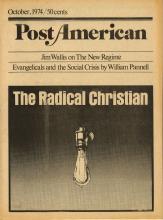When Richard Nixon promised the American people a “generation of peace,” most radicals chuckled and sneered. It’s a dogma with the Old Left and a tradition with the New that sooner or later, in one way or another, a revolution is coming to the United States, an upheaval that will sweep away not only the likes of the president but also the imperial order on which his pledge is apparently based. Of course, radicals argue endlessly about when and how this revolution will come, but almost all agree that it is on the way.
However, despite the rhetorical flourishes, the president apparently meant what he said. He told an interviewer, long before the rest of us had seen the light at the end of that famous tunnel, that he was convinced Vietnam would be America’s last war—“Yes,” he said, “the very last one.” I believe it’s time radicals stopped snickering and considered these assertions, because the odds are that he’s closer to being right than we are.
Consider, for a beginning, the fact that Nixon’s foreign policy over the past three years all but admits: that it was the
Read the Full Article

